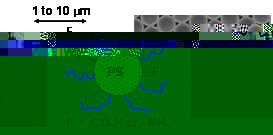The Polymer and Colloids Group
 Many biodiagnostic assays depend upon the attachment of biomolecules to the surface of polymer particles with diameters in the micrometer range. Functional particles of this size can be synthesized in current technology, using cumbersome multistep methods. In principle, dispersion polymerization should provide an easier, more direct route to these kinds of particles. The dispersion polymerization of styrene in ethanol easily gives highly monodisperse particles of this size. Unfortunately, the reaction outcome is very sensitive to the presence of additives such as functional or crosslinking comonomers. When these comonomers are included in the reaction, one loses control over the size and size distribution of the particles. We have discovered that if one delays adding the problematic monomers until the particle nucleation stage is complete (<5% monomer conversion), we can regain control over particle size and narrow size distribution. [see J. Amer. Chem. Soc., 126, 6562-6563 (2004).] We are exploring the scope of this discovery.
Many biodiagnostic assays depend upon the attachment of biomolecules to the surface of polymer particles with diameters in the micrometer range. Functional particles of this size can be synthesized in current technology, using cumbersome multistep methods. In principle, dispersion polymerization should provide an easier, more direct route to these kinds of particles. The dispersion polymerization of styrene in ethanol easily gives highly monodisperse particles of this size. Unfortunately, the reaction outcome is very sensitive to the presence of additives such as functional or crosslinking comonomers. When these comonomers are included in the reaction, one loses control over the size and size distribution of the particles. We have discovered that if one delays adding the problematic monomers until the particle nucleation stage is complete (<5% monomer conversion), we can regain control over particle size and narrow size distribution. [see J. Amer. Chem. Soc., 126, 6562-6563 (2004).] We are exploring the scope of this discovery.